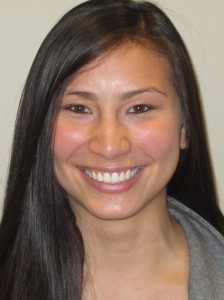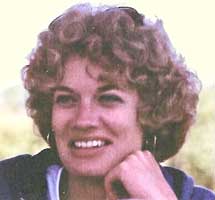Jessica Raugitinane, the 2012 Alma Exley Scholar, was the guest speaker at the reception on April 29, 2014 when Jessica Myers was honored. At the time, Ms. Raugitinane was completing her studies toward a master’s degree at the University of Connecticut. In her remarks, she addressed issues of race and privilege, reflecting on her experience in the fall of 2013 when she taught and did research in a highly selective UConn program in London, England. Following are her remarks.

Good evening. It feels great to be back in this community of scholars which feels more like family with the constant support that comes from Woody and the scholarship committee. I’m so glad to welcome Jessica Myers into the family.
From one Jessica to another, congratulations on all of your accomplishments. I am particularly pleased with your involvement in the Urban Education Fellows Program, dedicated to exploring issues related to race, culture, and poverty in education. I am hopeful of our future when I see young leaders, like yourself, confront critical issues like race and poverty in order to improve education. Especially when race and socioeconomic status contribute tremendously to privilege.
Throughout my college experience, I have reflected a great deal on race and privilege. Generally, higher education is a predominately white setting. Therefore, I have often felt like a cultural outsider. I have felt that I don’t belong or that I’m different. Especially being both Asian and Hispanic, I felt that I had to choose between my two cultures in order to fit in with a social group.
Also, as a part of a teacher preparation program that has roughly 130 students and only 8 students of color, again I feel isolated. I usually am the only student of color in the classroom or the only teacher of color in my clinic placements. In the midst of whiteness, my otherness is salient to me.
I became hyperaware of my cultural identity, especially during my experience in London last fall. There were 14 students in my London cohort, and I was the only student of color. I lived with the 9 other girls in a small apartment. We did everything together, from living together, to going out together, to going to class and internship together. This bubble intensified my awareness and anxiety of my otherness.
Returning to UConn, I brought back with me this hyperawareness of my cultural identity. I began to analyze my environment more closely. For instance, this spring, I began my Master’s internship in a Mansfield elementary school conducting Writer’s Workshop. This school in Mansfield is predominately white and is deemed a successful school with supportive administration and teachers along with an abundance of resources.
I immediately compared this to my student teaching experience in Hartford. This Hartford K-8 school is predominately filled with students of color and is deemed a failing school, with unstable administration, low expectations of student achievement, and a lack of resources. I could only dwell on how unfair this was. These two student populations receive two totally different educations, essentially because of the race and socioeconomic status they were born into.
With my frustration of always being an other and my anger towards social inequities, I became overwhelmed with society. I questioned how much of an impact I could really have on my students, especially with my desire to work in underprivileged areas. I thought to myself, “How can I help my students succeed, when I feel that society sets them up to fail?” Ultimately, I felt helpless as a teacher. I felt like there was nothing I could do and that I would just have to deal with society the way it is.
My frustration with society was constantly on my mind, which led me to express my feelings with my fellow peers of color. Daniel, who’s actually here with me today, was one of my peers who dealt with my venting. Dan can tell you, that I was extremely pessimistic about the future of society and my success as a teacher. Yet, after awhile, venting gets old. I needed to direct my frustration into positivity and be proactive. If I couldn’t change society on a large scale, I needed to do it on a smaller scale.
So, I decided to email my advisor of my London cohort, who leads our seminar class every Friday. I emailed him expressing how the issues of race and privilege have been bothering me and if we could possibly implement these topics in future class discussions.
I chose to address issues of racism and privilege to my London cohort since our research project revolved around global competence and how to make it a focus in education. I thought issues of racism and privilege fit in well with this global perspective. I decided that bringing up issues of racism and privilege would benefit not only my personal growth, but also the growth of my peers as teachers and people.
Thankfully my London advisor was more than supportive in collaborating with me. He advised me to read Beverly Tatum’s book, Why Are All the Black Kids Sitting Together in the Cafeteria? I must say I highly recommend this book. It opened my eyes and perspective on my own racial identity development, but also to view racism as a system of advantages and disadvantages rather than individual acts of prejudice.
My professor and I assigned chapters of the book along with Peggy McIntosh’s White Privilege article for my cohort to read. I created guiding questions to facilitate discussion. We spent only two class periods on these readings. I must say, I did not expect my peers to change much in perspective especially only after 5 hours of discussion, but the end result exceeded my expectations.
From our explicit discussions on taboo subjects like racism and privilege, I find that my peers and I now feel free to bring up these topics in everyday conversations and feel accountable to address these issues in our classrooms. The London cohort has a Facebook group, with the original purpose of contacting one another about travel plans and homework while we were in London. Now I am pleased to say that it has become a place for discussion, where many individuals post articles and news stories relating to race, privilege, and inequities.
Before my decision to be proactive, I can say that society silenced me. I felt uncomfortable and ashamed to speak up against injustices that I experienced in everyday occurrences. I felt helpless in trying to help others to succeed. However, after taking the initiative to openly discuss taboo subjects with my peers, I feel empowered.
I feel that I am finally developing my voice. Most important, I recognize the strength and value of my voice. It can get overwhelming trying to change this big thing called society, but I realize that I have a profound effect on my sphere of influence. We all do.
My sphere of influence includes my family, friends, peers, colleagues, students, and my students’ families. I take responsibility to use my voice not only to empower myself as a citizen of society, but also to promote a critical consciousness within my sphere of influence.
A critical consciousness means learning to identify the many isms of society, whether it is racism, sexism, classism, ageism, etc. According to clinical psychologist Beverly Tatum, with a critical consciousness “we are better able to resist the negative impact of oppressive messages when we see them coming than when they are invisible to us.” As educators, we must make inequities explicit to our students, make it everyday conversation, so that injustice becomes visible. As Tatum wrote, once we notice something, it becomes hard to ignore.
Encouraging students to question society and analyze societal messages and their effects will be at the forefront of my teaching. I want to empower my students to take ownership of their identities. I want my students to externalize everything that society has told them to internalize. I want my students to be in control of their identities and their futures.
Janie Ward, a professor at Simmons College, has written about a child-rearing process she calls “raising resisters.” Essentially, I want my students to be resisters. I want them to resist oppression. I want them to speak up. When we break the silence, we break the cycle of oppression. In a society hindered by isms, we must develop informed, brave voices that identify and speak against ongoing injustices, especially within a society that oppresses silently.
I am relieved that I found my voice before society could determine my future. As educators, we must help our students to find their voices as a way for them to take control of their own lives. I hope all of us will continue to develop our voices to speak up and raise resisters.
Thank you.
